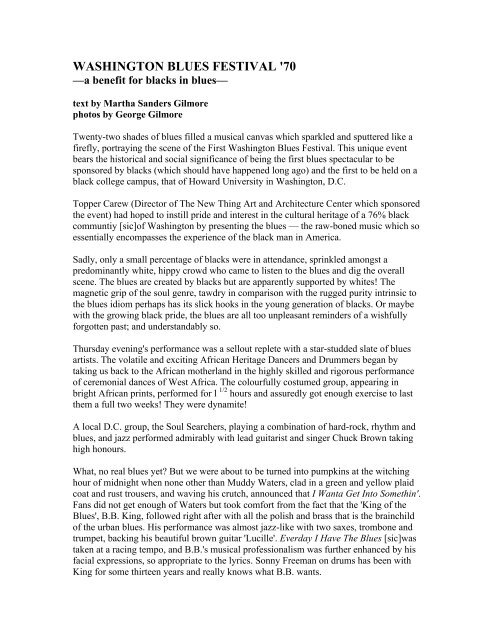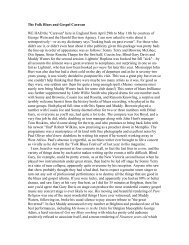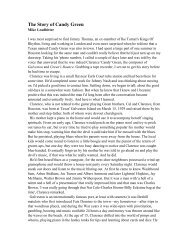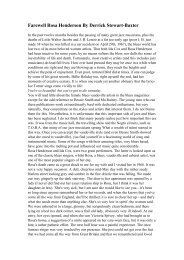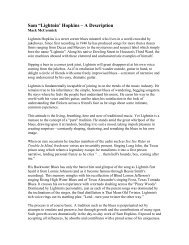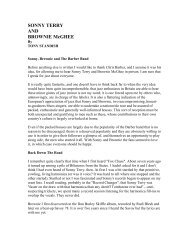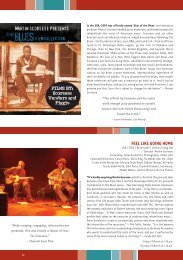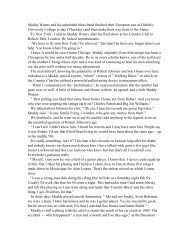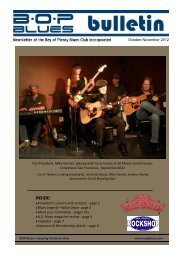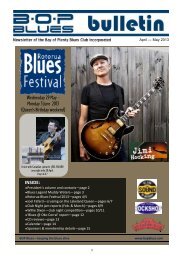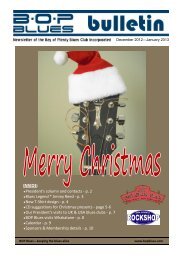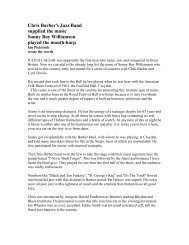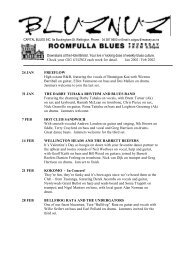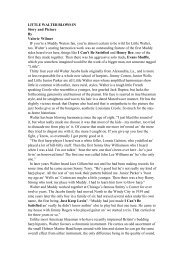WASHINGTON BLUES FESTIVAL '70
WASHINGTON BLUES FESTIVAL '70
WASHINGTON BLUES FESTIVAL '70
You also want an ePaper? Increase the reach of your titles
YUMPU automatically turns print PDFs into web optimized ePapers that Google loves.
<strong>WASHINGTON</strong> <strong>BLUES</strong> <strong>FESTIVAL</strong> <strong>'70</strong><br />
—a benefit for blacks in blues—<br />
text by Martha Sanders Gilmore<br />
photos by George Gilmore<br />
Twenty-two shades of blues filled a musical canvas which sparkled and sputtered like a<br />
firefly, portraying the scene of the First Washington Blues Festival. This unique event<br />
bears the historical and social significance of being the first blues spectacular to be<br />
sponsored by blacks (which should have happened long ago) and the first to be held on a<br />
black college campus, that of Howard University in Washington, D.C.<br />
Topper Carew (Director of The New Thing Art and Architecture Center which sponsored<br />
the event) had hoped to instill pride and interest in the cultural heritage of a 76% black<br />
communtiy [sic]of Washington by presenting the blues — the raw-boned music which so<br />
essentially encompasses the experience of the black man in America.<br />
Sadly, only a small percentage of blacks were in attendance, sprinkled amongst a<br />
predominantly white, hippy crowd who came to listen to the blues and dig the overall<br />
scene. The blues are created by blacks but are apparently supported by whites! The<br />
magnetic grip of the soul genre, tawdry in comparison with the rugged purity intrinsic to<br />
the blues idiom perhaps has its slick hooks in the young generation of blacks. Or maybe<br />
with the growing black pride, the blues are all too unpleasant reminders of a wishfully<br />
forgotten past; and understandably so.<br />
Thursday evening's performance was a sellout replete with a star-studded slate of blues<br />
artists. The volatile and exciting African Heritage Dancers and Drummers began by<br />
taking us back to the African motherland in the highly skilled and rigorous performance<br />
of ceremonial dances of West Africa. The colourfully costumed group, appearing in<br />
bright African prints, performed for l 1/2 hours and assuredly got enough exercise to last<br />
them a full two weeks! They were dynamite!<br />
A local D.C. group, the Soul Searchers, playing a combination of hard-rock, rhythm and<br />
blues, and jazz performed admirably with lead guitarist and singer Chuck Brown taking<br />
high honours.<br />
What, no real blues yet? But we were about to be turned into pumpkins at the witching<br />
hour of midnight when none other than Muddy Waters, clad in a green and yellow plaid<br />
coat and rust trousers, and waving his crutch, announced that I Wanta Get Into Somethin'.<br />
Fans did not get enough of Waters but took comfort from the fact that the 'King of the<br />
Blues', B.B. King, followed right after with all the polish and brass that is the brainchild<br />
of the urban blues. His performance was almost jazz-like with two saxes, trombone and<br />
trumpet, backing his beautiful brown guitar 'Lucille'. Everday I Have The Blues [sic]was<br />
taken at a racing tempo, and B.B.'s musical professionalism was further enhanced by his<br />
facial expressions, so appropriate to the lyrics. Sonny Freeman on drums has been with<br />
King for some thirteen years and really knows what B.B. wants.
Folk-blues artist Richie Havens, with unamplified guitar and an unobtrusive set of<br />
African drums, began all his songs with Beethovenesque introductions. He was<br />
outstanding in his rendition of God Bless The Child followed by Freedom which affected<br />
the audience like a drug in its frantic rhythmic pulse and wildfire momentum. However,<br />
the audience needed no more drugs in this case, the inevitable by product of the festival<br />
phenomenon.<br />
Blues have experienced a migratory history like the people who sing them, springing in<br />
rhythmic vibrations from an African motherland, born and raised in the cotton fields and<br />
work farms of the rural South, nurtured by the gospel of the church, and polished and<br />
achieving complexity and urbanity as a result of a musical migration northward to the<br />
City where one may hear the electric blues guitarists today. The traditional twelve-bar<br />
blues structure has survived through it all and remains the basis of the form. Thus, the<br />
Howard University Gospel Choir, forty-strong and surging in cadence, sang hymns of joy<br />
such as Oh Happy Day, the youngest of a three-generation span represented at the<br />
festival. For the blues are happening now. They are survival!<br />
One of the more interesting aspects of the folk art that is the blues lies within its bold<br />
regionalisms and dialects, In the very lovely Libba Cotton from Chapel Hill, N.C. we<br />
were exposed to the beauty and purity of one of the few female blues singers alive today<br />
who, in the highly anecdotal blues manner, told of how she worked for 75c a month to<br />
buy her first guitar for $3.75. Then, with a light touch, she played her own composition<br />
Freight Train.<br />
Unearthing those integral roots of the blues from gospel soil was Rev. Robert Wilkins<br />
whose delivery was resonant and low-keyed. The key changed with the appearance of<br />
Furry Lewis, cavorting about the stage with his false leg, the result of a train mishap<br />
years ago. Furry hails from Greenwood, Mississippi, the blues centre which has produced<br />
numerous blues artists. He played bottleneck guitar, summoning up old favourites such as<br />
W. C. Handy's St Louis Blues.<br />
The South Side Band known as The Hawks of J. B. Hutto played a kind of rhythm and<br />
blues with a strong boogie beat. J. B. Hutto is illustrative of the fact that the blues is the<br />
music of the working man, having left his homestate of Georgia to work in the steel mills<br />
of Chicago. His particular brand of urban blues is indicative of how fundamental blues<br />
are to jazz, rock, folk, country music, soul, and our more traditional song forms. With his<br />
cool, controlled style he provided the most excitement of the evening.<br />
Another Chicago blues man, one Luther Allison, with his West Side Blues Band,<br />
stomped around the stage like a matador, and played a rock-oriented style of guitar,<br />
provocative and sexual in implication. He reared back in Please Send Me Someone To<br />
Love, slowed up on One Room Country Shack, but let the people have it in a yodelling,<br />
banjo-like version of Coming Round The Mountain. Allison finished down on the floor<br />
rubbing his guitar against his backside.
Delta Blues Singer Mississippi Fred McDowell, who 'doesn't play rock 'n roll' sang with a<br />
country twang, executing some complex lines in his famous 61 Highway, 'which has<br />
taken so many lives'.<br />
Howlin' Wolf, all 250-pounds of him, boomed out I'm The Trail Dragger, accompanied<br />
by Sonny Boy Slim on bar-room piano. Wolf played Highway 49 on harp, acting out the<br />
lyrics and commenting that 'I was raised in Mississippi I don't know no better'.<br />
The final night featured the angular form of blind Sleepy John Estes from Brownsville,<br />
Tennessee. Estes is in his mid-sixties now, and was accompanied by Yank Rachell on an<br />
electric mandolin (which proved a bit too loud) and Hammie Nixon on harp. Estes ran<br />
through Dime A Dozen but it was difficult to understand the lyrics while Rachell cut up,<br />
dancing about and cajoling that 'I have the blues the way a cat has fleas; have the blues so<br />
bad they turned to blacks!'<br />
In our opinion, and seemingly the crowd's as well, the most outstanding performer of the<br />
evening was John Jackson from Rappahanock County, Virginia who plays an<br />
exceptionally complex acoustic guitar, inserting so many changes into his music that you<br />
can't count them. He has the wonderful sing-song drawl of Virginia which somehow<br />
manages to make two syllables out of every one, and as much charm and warmth as any<br />
blues singer around. Resplendent in wide-brim hat, he ran through verse after verse of<br />
Police Dog and the famous John Henry on which he played slide guitar. He achieves his<br />
bottleneck sound by holding the end of a knife between his index and middle fingers, His<br />
intricacy and beauty was unparallelled.<br />
A decided contrast to Jackson followed with the Southside Blues Band of Buddy Guy and<br />
Junior Wells, who teased and taunted the blues. Guy was smashing in a suit of<br />
watermelon red, holding his guitar over his head and on his hip, — a real showman!<br />
Arthur Big Boy Crudup 'don't play nothin' but the blues', which he proved in an extended<br />
set. A charming gentleman, Crudup played acoustic guitar, and sang some liquid blues<br />
lines on such tunes as Mean Old Frisco.<br />
Texas-born Mance Lipscomb displayed a very melodic style on acoustic guitar. His voice<br />
is as mellow and smooth as corn silk as he demonstrated in a set of old tunes. It was C. C.<br />
Rider which stopped the show however. To achieve his bottleneck sound, Lipscomb put<br />
his pocket knife to use.<br />
The nightcap lay in a family reunion and blending of the old and new consisting of<br />
Buddy Guy and Junior Wells, Luther Allison, and J. B. Hutto, topped off with the purity<br />
and country flavour that is the art of Mississippi Fred McDowell. The crowd rushed<br />
down front. The musicians could have played all night in a veritable jam session of the<br />
blues—a real homecoming for these bluesmen from so many parts of the country.
The blues speak of survival and tell about the hard times inherent in the black man's<br />
plight in America. They carry a message of historical import, transmitting a philosophy<br />
that turns its back on defeat.<br />
(From Jazz Journal February 1971, pages 18-29 less photos of Jackson, Estes,<br />
Hutto, Cotton, Guy/Wells and King)


